Caryn’s Thoughts

 Sometimes, the best of intentions can go horribly wrong, and when things go wrong, it becomes a disaster, and disaster is exactly what happened in Centralia, Pennsylvania when a fire was set to burn out an old landfill before the Labor Day holiday in 1962. The fire that was started on May 27, 1962, seemed like a simple solution to a big mess, but the landfill was also an old strip-mine pit, connected to a maze of abandoned underground mining tunnels full of coal. No one knows how the fire got to the coal vein below the ground, but once it did, the situation was out of control. Some called it careless trash incineration in a landfill next to an open pit mine, which ignited a coal vein, but no one expected the fire to crawl insidiously along the rich coal deposits that still laid deep in the ground. No one expected the burning coal to vent hot and poisonous gases up into town, through the basements of homes and businesses. Nevertheless, with dawn came the horror, as residents realized that the fire was not going to be extinguished, or in fact, ever burn itself out…at least not until all the interconnected coal veins in eastern Pennsylvania were finally burned out. As the underground fire worked its way under rows of homes and businesses, the threat of fires, asphyxiation, and carbon monoxide poisoning became a daily concern.
Sometimes, the best of intentions can go horribly wrong, and when things go wrong, it becomes a disaster, and disaster is exactly what happened in Centralia, Pennsylvania when a fire was set to burn out an old landfill before the Labor Day holiday in 1962. The fire that was started on May 27, 1962, seemed like a simple solution to a big mess, but the landfill was also an old strip-mine pit, connected to a maze of abandoned underground mining tunnels full of coal. No one knows how the fire got to the coal vein below the ground, but once it did, the situation was out of control. Some called it careless trash incineration in a landfill next to an open pit mine, which ignited a coal vein, but no one expected the fire to crawl insidiously along the rich coal deposits that still laid deep in the ground. No one expected the burning coal to vent hot and poisonous gases up into town, through the basements of homes and businesses. Nevertheless, with dawn came the horror, as residents realized that the fire was not going to be extinguished, or in fact, ever burn itself out…at least not until all the interconnected coal veins in eastern Pennsylvania were finally burned out. As the underground fire worked its way under rows of homes and businesses, the threat of fires, asphyxiation, and carbon monoxide poisoning became a daily concern.
Probably one of the scariest situations was when a young man, Todd Domboski fell into a hot, steaming hole created by mine fire subsidence. He survived his 45 second ordeal by grabbing onto tree roots, and screaming for help until his cousin ran to his aid, reached into the void, and hoisted him out. Many Centralia residents had worried that a calamity like the one that nearly unfolded that Valentine’s Day in 1981. Four years earlier, Domboski’s father had told a reporter, “I guess some kid will have to get killed by the gas or by falling in one of these steamy holes before anyone will call it an emergency.” Never did he imagine that it would be his kid that would fall through and almost lose his life.
After the near tragedy, signs were posted to warn visitors to the Centralia area about the dangers of death by asphyxiation or being swallowed by the ground, but the old mining town of Centralia, Pennsylvania, was once home to more than 1,000 people. People with no place else to go. Now, it’s nothing more than a smoldering ghost town that’s been burning for over half a century. Though the town was able to extinguish the fire above ground, a much bigger inferno burned underneath, and it eventually spread its way under Centralia’s town center. The fire was so widespread, destructive and unending. It’s thought that there’s enough coal underground to fuel the fire for another 250 years. In 1980, a $42 million relocation plan incentivized most of the townspeople to relocate and most of the homes were demolished, leaving only about a dozen holdouts behind. Today, Centralia exists only as an eerie grid of streets, its driveways disappearing into vacant lots. Remains of a picket fence here, a chair spindle there. Still John Lokitis and 11 others who refused to leave, the 
 occupants of a dozen scattered structures. Over the decades, the ground has opened up with sulfurous gases sometimes billowing out. The road along Highway 61 swells and cracks open. It is riddled with graffiti and hot to the touch. In the winter, snow melts in patches where the ground is warm. While a few holdouts still live there, I have to wonder what they are thinking. That is like slowly committing suicide, because you refuse to leave the past.
occupants of a dozen scattered structures. Over the decades, the ground has opened up with sulfurous gases sometimes billowing out. The road along Highway 61 swells and cracks open. It is riddled with graffiti and hot to the touch. In the winter, snow melts in patches where the ground is warm. While a few holdouts still live there, I have to wonder what they are thinking. That is like slowly committing suicide, because you refuse to leave the past.
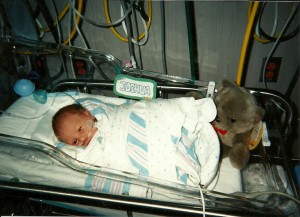
 When a child is born, you think about what they will become. Your thoughts drift to the future…that seems so distant, and you think to yourself, “The future is still so far away.” Then, much sooner than you ever thought possible, the future arrives, and your little baby is suddenly 18 years old, and graduating from high school. Then you think, “Where have the years gone?” It doesn’t matter if that child is your child or your grandchild either. The future arrives so fast. I’ve said it many times before. When you look at that precious baby, you must be aware that next week, they will be graduating from high school, and going off to make their own way in the world. In time and space, it may not be a week, but it will most certainly feel like it was.
When a child is born, you think about what they will become. Your thoughts drift to the future…that seems so distant, and you think to yourself, “The future is still so far away.” Then, much sooner than you ever thought possible, the future arrives, and your little baby is suddenly 18 years old, and graduating from high school. Then you think, “Where have the years gone?” It doesn’t matter if that child is your child or your grandchild either. The future arrives so fast. I’ve said it many times before. When you look at that precious baby, you must be aware that next week, they will be graduating from high school, and going off to make their own way in the world. In time and space, it may not be a week, but it will most certainly feel like it was.
That is where my daughter, Corrie Petersen and her husband, Kevin find themselves today as their son, Joshua 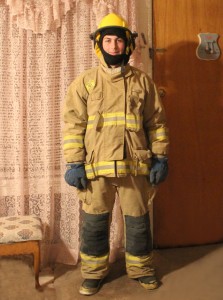
 Petersen graduates from Kelly Walsh High School. Josh has changed so much over the years. His beginning was a little rocky, as he jumped the gun and arrived five weeks early. After spending two weeks in Denver, at Presbyterian Saint Luke’s Hospital, Josh was finally ready to come home and join the rest of his family. His rocky start over now, Josh quickly ate everything is sight, trying to make up for lost time, I think. Yes, Josh has changed in many ways, but in many other ways, he has not changed at all. He has always been a wonderful young man with a caring heart, and in that way, he will never change. He is so considerate of the feelings of others.
Petersen graduates from Kelly Walsh High School. Josh has changed so much over the years. His beginning was a little rocky, as he jumped the gun and arrived five weeks early. After spending two weeks in Denver, at Presbyterian Saint Luke’s Hospital, Josh was finally ready to come home and join the rest of his family. His rocky start over now, Josh quickly ate everything is sight, trying to make up for lost time, I think. Yes, Josh has changed in many ways, but in many other ways, he has not changed at all. He has always been a wonderful young man with a caring heart, and in that way, he will never change. He is so considerate of the feelings of others.
As the years have passed, we saw in Josh a gentleness and sincere caring for those in need of health care. When he was just six years old, he started helping take care of his grandparents, and he continued doing that until three had passed away, and the last one was in a nursing home. Josh was meticulous with their care. If you showed him how to do something, he did it exactly that way. For that reason, I was not surprised when Josh announced, “I want to be a firefighter.” I don’t think there was a shocked face in the place. Now, I know that a lot of kids say they want to be a firefighter, but Josh meant it. He even began taking Boces classes 
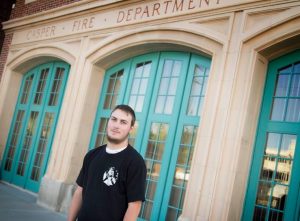 toward his degree in high school. Josh is so driven, so goal oriented, and that makes me so proud of him. I have no doubt that he will be arriving at his life’s destination very quickly. The years have flown by far too fast. It seems like Josh should still be little boy, and yet here he is at the threshold of adulthood. Josh, we are so proud of your hard work and perseverance. I know that you will go far in life and in your chosen field. We are so very proud of your abilities, drive, and mostly your kind heart. Congratulations on your graduation!!
toward his degree in high school. Josh is so driven, so goal oriented, and that makes me so proud of him. I have no doubt that he will be arriving at his life’s destination very quickly. The years have flown by far too fast. It seems like Josh should still be little boy, and yet here he is at the threshold of adulthood. Josh, we are so proud of your hard work and perseverance. I know that you will go far in life and in your chosen field. We are so very proud of your abilities, drive, and mostly your kind heart. Congratulations on your graduation!!

 My niece, Cassie Iverson is a mother of 2, a wife, and a photographer. She specializes in Wyoming wilderness photography, and her landscapes are amazing. She has such a great eye for color and interest. Her photos draw you into the scene until you feel like you are standing right there next to her, and isn’t that the mark of a great photographer. Cassie has begun selling her photography at Essence Wyoming Photography on Facebook. Cassie and her husband, Chris love to take their kids, Lucas and Zoey camping on the weekends, and it also gives Cassie lots of inspiration for her photography. Sometimes they just go for photography drives into the country to give Cassie a chance to take more pictures, and to get everyone out of the house and into nature.
My niece, Cassie Iverson is a mother of 2, a wife, and a photographer. She specializes in Wyoming wilderness photography, and her landscapes are amazing. She has such a great eye for color and interest. Her photos draw you into the scene until you feel like you are standing right there next to her, and isn’t that the mark of a great photographer. Cassie has begun selling her photography at Essence Wyoming Photography on Facebook. Cassie and her husband, Chris love to take their kids, Lucas and Zoey camping on the weekends, and it also gives Cassie lots of inspiration for her photography. Sometimes they just go for photography drives into the country to give Cassie a chance to take more pictures, and to get everyone out of the house and into nature.
While photography is Cassie’s forté, her life is her family. She loves her babies with all her heart, and her 
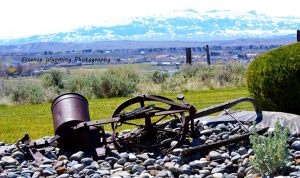 husband too, of course. She enjoys cooking for her family, and she is an amazing cook. She is a mom of two busy little kids, and they keep her hopping. Her oldest child, Lucas graduated from preschool a few days ago. It was an amazing accomplishment for Lucas. His journey has not been an easy one, with Down’s Syndrome, but Cassie and Chris have done an amazing job of helping him to reach his full potential. Both of their kids are very sweet.
husband too, of course. She enjoys cooking for her family, and she is an amazing cook. She is a mom of two busy little kids, and they keep her hopping. Her oldest child, Lucas graduated from preschool a few days ago. It was an amazing accomplishment for Lucas. His journey has not been an easy one, with Down’s Syndrome, but Cassie and Chris have done an amazing job of helping him to reach his full potential. Both of their kids are very sweet.
Cassie and Chris love to go camping, and they love fishing. In reality, they love animals…especially taking pictures of wild animals. They have horses, dogs, and a rare Highlander cat. Now, I didn’t really know why this was a rare cat, so I looked it up. A Highlander cat is a hybrid cat. The Highlander cat is a curl-eared variant of the Desert Lynx breed, crossed with the Jungle 
 Curl to achieve the curled ears. As Desert Lynxes, they are bobtailed or short-tailed, have spotted or marbled markings, and resemble the bobcat, however, they have no actual wild lynx or bobcat ancestry, making them completely domesticated. This cat does get to be about 14 pounds, however. Now that is quite a cat. All in all, Cassie leads a busy life, but it totally fulfills all of her dreams. Today is Cassie’s birthday. Happy birthday Cassie!! Have a great day!! We love you!!
Curl to achieve the curled ears. As Desert Lynxes, they are bobtailed or short-tailed, have spotted or marbled markings, and resemble the bobcat, however, they have no actual wild lynx or bobcat ancestry, making them completely domesticated. This cat does get to be about 14 pounds, however. Now that is quite a cat. All in all, Cassie leads a busy life, but it totally fulfills all of her dreams. Today is Cassie’s birthday. Happy birthday Cassie!! Have a great day!! We love you!!
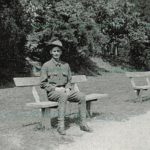
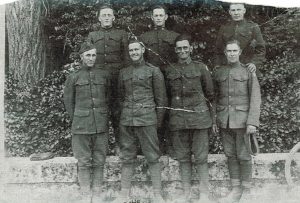 When the United States entered World War I, they sent men into France to join Allied forces there. Their arrival was a great relief to the exhausted Allied soldiers. Before long the American soldiers in France became known as Doughboys. This was not an unknown term, since it had been used For centuries to describe such soldiers as Horatio Nelson’s sailors and Wellington’s soldiers in Spain, for instance. Both of these groups were familiar with fried flour dumplings called doughboys, the predecessor of the modern doughnut that both we and the Doughboys of World War I came to love. The American Doughboys were the men America sent to France in the Great War, who beat Kaiser Bill and fought to make the world safe for Democracy.
When the United States entered World War I, they sent men into France to join Allied forces there. Their arrival was a great relief to the exhausted Allied soldiers. Before long the American soldiers in France became known as Doughboys. This was not an unknown term, since it had been used For centuries to describe such soldiers as Horatio Nelson’s sailors and Wellington’s soldiers in Spain, for instance. Both of these groups were familiar with fried flour dumplings called doughboys, the predecessor of the modern doughnut that both we and the Doughboys of World War I came to love. The American Doughboys were the men America sent to France in the Great War, who beat Kaiser Bill and fought to make the world safe for Democracy.
It is thought, however, that the Doughboys of World War I might have acquired the name in a slightly different way. In fact, there are a variety of theories about the origins of the nickname. One explanation is that the term dates back to the Mexican War of 1846 to 1848, when American infantrymen made long treks over dusty terrain, giving them the appearance of being covered in flour, or dough. As a variation of this account goes, the men were coated in the dust of adobe soil and as a result were called “adobes,” which morphed into “dobies” and, eventually into “doughboys.” Among other theories, according to “War Slang” by Paul Dickson, American journalist and lexicographer H.L. Mencken claimed the nickname could be traced to Continental Army soldiers who kept the piping on their uniforms white through the application of clay. When the troops got rained on the clay on their uniforms turned into “doughy blobs,” supposedly leading to the doughboy moniker.
Whatever the case may be, doughboy was just one of the nicknames given to those who fought in the Great War. For example, “poilu” meaning “hairy one” was a term for a French soldier, as a number of them had beards or mustaches, while a popular slang term for a British soldier was “Tommy,” an abbreviation of Tommy Atkins, a generic name similar to John Doe used in the Unites States on government forms. America’s last 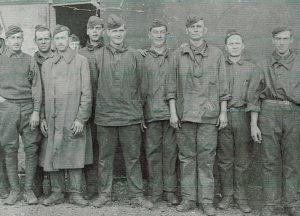
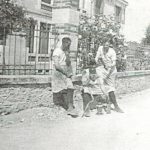 World War I doughboy, Frank Buckles, died in 2011 in West Virginia at age 110. Buckles enlisted in the Army at age 16 in August 1917, four months after the United States entered the conflict, and drove military vehicles in France. One of 4.7 million Americans who served in the war, Buckles was buried at Arlington National Cemetery. It’s strange to think that my grandfather, George Byer was one of the men called doughboys, but then he was stationed in France at that time in history, so I guess that Grandpa was a doughboy.
World War I doughboy, Frank Buckles, died in 2011 in West Virginia at age 110. Buckles enlisted in the Army at age 16 in August 1917, four months after the United States entered the conflict, and drove military vehicles in France. One of 4.7 million Americans who served in the war, Buckles was buried at Arlington National Cemetery. It’s strange to think that my grandfather, George Byer was one of the men called doughboys, but then he was stationed in France at that time in history, so I guess that Grandpa was a doughboy.
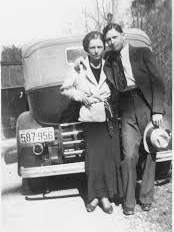
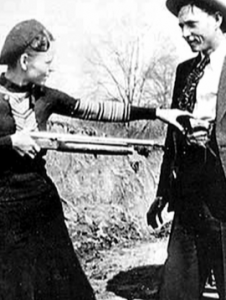 Most of the time, when we think of crime and criminals, we think of the worst evil there could be in a person, and I suppose that some criminals have more evil tendencies than others, but once in a while, someone decides to put a bit of a different twist on their crime…intending to romanticize it or give it a Robin Hood feel. In a large part, it is the media that truly romanticizes it or gives it notoriety. If the media didn’t report on every episode of the criminal’s life of crime, perhaps it would not seem so exciting to people, and maybe it wouldn’t inspire other criminals to…go for it. It all seems so exciting, at least that’s how the media plays it up.
Most of the time, when we think of crime and criminals, we think of the worst evil there could be in a person, and I suppose that some criminals have more evil tendencies than others, but once in a while, someone decides to put a bit of a different twist on their crime…intending to romanticize it or give it a Robin Hood feel. In a large part, it is the media that truly romanticizes it or gives it notoriety. If the media didn’t report on every episode of the criminal’s life of crime, perhaps it would not seem so exciting to people, and maybe it wouldn’t inspire other criminals to…go for it. It all seems so exciting, at least that’s how the media plays it up.
In reality, Bonnie and Clyde…notorious robbers and murders lived a very basic existence, and in many ways it was disgusting. Despite common popular culture depictions of Bonnie and Clyde, their life on the run was far from glamorous. They often ate sardines from the can, bathed in rivers, and drove through the night, taking shifts sleeping and driving, all in order to evade capture. They hid out in the forest, hoping not to be seen…always standing guard…always watching. Bonnie Parker met Clyde Barrow in Texas when she was 19 years old. Her husband, whom she married when she was 16, was serving time in jail for murder, and Clyde seemed exciting. Shortly after they met, Barrow was imprisoned for robbery. Bonnie visited Clyde every day, and smuggled a gun into prison to help him escape. He did escape, but was quickly recaptured in Ohio and sent back to jail. When Clyde was paroled in 1932, he immediately hooked up with Bonnie, and the couple began a life of crime together. Apparently Bonnie had a thing for bad boys…to her detriment, in the end.
The pair stole a car and committed several robberies, before Bonnie was caught by police and sent to jail for 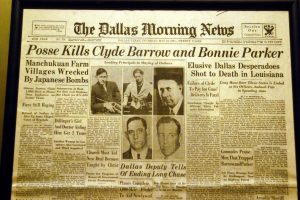 two months. Immediately after her release in mid-1932, she hooked up with Clyde again. Over the next two years, the couple teamed with various accomplices to rob a string of banks and stores across five states…Texas, Oklahoma, Missouri, New Mexico and Louisiana. To law enforcement agents, the Barrow Gang, including Clyde’s childhood friend, Raymond Hamilton, W.D. Jones, Henry Methvin, Barrow’s brother Buck and his wife Blanche, among others, were cold-blooded criminals who didn’t hesitate to kill anyone who got in their way, especially police or sheriff’s deputies. To the public, however, Bonnie and Clyde’s reputation as dangerous outlaws was mixed with a romantic view of the couple as “Robin Hood”-like folk heroes. Their fame was increased by the fact that Bonnie was a woman, which made her an unlikely criminal, and by the fact that the couple posed for playful photographs together, which were later found by police and released to the media. Police almost captured Bonnie and Clyde in the spring of 1933, with surprise raids on their hideouts in Joplin and Platte City, Missouri. Buck Barrow was killed in the second raid, and Blanche was arrested, but Bonnie and Clyde escaped once again. In January 1934, they attacked the Eastham Prison Farm in Texas to help Hamilton break out of jail, shooting several guards with machine guns…killing one.
two months. Immediately after her release in mid-1932, she hooked up with Clyde again. Over the next two years, the couple teamed with various accomplices to rob a string of banks and stores across five states…Texas, Oklahoma, Missouri, New Mexico and Louisiana. To law enforcement agents, the Barrow Gang, including Clyde’s childhood friend, Raymond Hamilton, W.D. Jones, Henry Methvin, Barrow’s brother Buck and his wife Blanche, among others, were cold-blooded criminals who didn’t hesitate to kill anyone who got in their way, especially police or sheriff’s deputies. To the public, however, Bonnie and Clyde’s reputation as dangerous outlaws was mixed with a romantic view of the couple as “Robin Hood”-like folk heroes. Their fame was increased by the fact that Bonnie was a woman, which made her an unlikely criminal, and by the fact that the couple posed for playful photographs together, which were later found by police and released to the media. Police almost captured Bonnie and Clyde in the spring of 1933, with surprise raids on their hideouts in Joplin and Platte City, Missouri. Buck Barrow was killed in the second raid, and Blanche was arrested, but Bonnie and Clyde escaped once again. In January 1934, they attacked the Eastham Prison Farm in Texas to help Hamilton break out of jail, shooting several guards with machine guns…killing one.
Texan prison officials hired Captain Frank Hamer, a retired Texas police officer, as a special investigator to track down Bonnie and Clyde. After a three month search, Hamer traced the couple to Louisiana, where Henry Methvin’s family lived. Bonnie and Clyde appeared, the officers opened fire, killing the couple instantly in a hail of 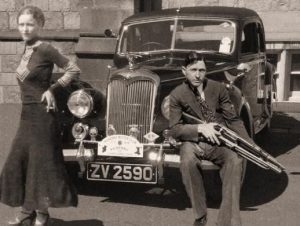
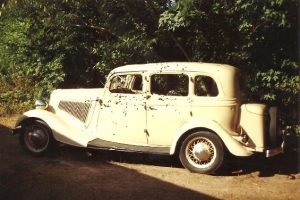 bullets. All told, the Barrow Gang was believed to have been responsible for the deaths of 13 people, including nine police officers. Bonnie and Clyde are still seen by many as romantic figures, however, especially after the success of the 1967 film Bonnie and Clyde, starring Faye Dunaway and Warren Beatty. It’s really a sad thing when crime is romanticized, because people think of it as an exciting, when in fact, it is a dead end road.
bullets. All told, the Barrow Gang was believed to have been responsible for the deaths of 13 people, including nine police officers. Bonnie and Clyde are still seen by many as romantic figures, however, especially after the success of the 1967 film Bonnie and Clyde, starring Faye Dunaway and Warren Beatty. It’s really a sad thing when crime is romanticized, because people think of it as an exciting, when in fact, it is a dead end road.

 For most of her life, my sister-in-law, Brenda Schulenberg struggled with her weight. Even as a child, Brenda was heavy. She will tell you that her weight prevented her from doing many of the things that most children took for granted, such as riding a bicycle. She might have been able to do it to a degree, but not for very long or very far. As she grew into adulthood, her weight became such a problem that she couldn’t even think of riding a bicycle. Then one day, her health failed due to her weight. She knew that she had to make a change. That day was October 18, 2013…just 5½ months after her dad, Walt Schulenberg passed away. Brenda became a health nut. She learned to eat right, and she walked…slowly and with a walker at first, and later on her own. She walked further and further…often reaching 10 miles a day. The weight came off, and she felt much better. Still, one thing eluded her…riding a bicycle. Finally, the day arrived when Brenda found out that she could ride a bicycle…as long as the peddles were off, and she could reach the ground. It’s called strider riding. It is a bicycle, but the rider basically runs the bicycle down the trail, instead of riding it…and Brenda could do that.
For most of her life, my sister-in-law, Brenda Schulenberg struggled with her weight. Even as a child, Brenda was heavy. She will tell you that her weight prevented her from doing many of the things that most children took for granted, such as riding a bicycle. She might have been able to do it to a degree, but not for very long or very far. As she grew into adulthood, her weight became such a problem that she couldn’t even think of riding a bicycle. Then one day, her health failed due to her weight. She knew that she had to make a change. That day was October 18, 2013…just 5½ months after her dad, Walt Schulenberg passed away. Brenda became a health nut. She learned to eat right, and she walked…slowly and with a walker at first, and later on her own. She walked further and further…often reaching 10 miles a day. The weight came off, and she felt much better. Still, one thing eluded her…riding a bicycle. Finally, the day arrived when Brenda found out that she could ride a bicycle…as long as the peddles were off, and she could reach the ground. It’s called strider riding. It is a bicycle, but the rider basically runs the bicycle down the trail, instead of riding it…and Brenda could do that. 
After riding strider style for a time, Brenda was finally able to ride a bicycle in the normal way. She put the peddles back on her purple bicycle and off she went. Brenda became just like the postal service…”Neither snow nor rain nor heat nor gloom of night stays these couriers from the swift completion of their appointed rounds.” Ok, Brenda didn’t have appointed rounds…exactly, but she had set herself a goal of riding her bicycle every month of the year. Now, that is not an easy task, especially in the state of Wyoming, where winters can be brutal. Nevertheless, just like the postal worker, neither rain, nor sleet, nor snow, nor gloom of the very early morning will keep Brenda from riding her bicycle. She is determined to ride it, and make up for all the years that she couldn’t even ride a bicycle in the summertime, much less in the winter.
She’s a brave woman, especially when she goes out in the middle of a snow story, and pretty much turns into a 
 snow woman. She reminds me of the Campbell’s Soup commercial where the little boy is so covered with snow that only a hot bowl of soup will melt away all the snow. Maybe she’s not that bad, but she’s close. Brenda, we are proud of your determination, but I do have to wonder if the people driving by the snow woman on wheels have to rubs their eyes to make sure they are seeing what their eyes are telling them they are seeing. Today is Brenda’s birthday. Happy birthday Brenda!! Have a great day!! We love you!!
snow woman. She reminds me of the Campbell’s Soup commercial where the little boy is so covered with snow that only a hot bowl of soup will melt away all the snow. Maybe she’s not that bad, but she’s close. Brenda, we are proud of your determination, but I do have to wonder if the people driving by the snow woman on wheels have to rubs their eyes to make sure they are seeing what their eyes are telling them they are seeing. Today is Brenda’s birthday. Happy birthday Brenda!! Have a great day!! We love you!!

 My grand nephew, Xander Spethman is growing up so fast. It seems like yesterday that he was a little boy, and now I see a tall young man of 14 years. He has grown so tall and strong that I find myself having to do a double take to make sure it is Xander that I’m looking at…in fact, I recently saw him on the trail my husband and I walk on, and almost didn’t recognize him at all…and talking to him doesn’t help either, because his voice is suddenly pretty deep. I’m sure his years of doing sports have contributed to his new physique, and the fact that his dad, Steve Spethman is a man with big shoulders had a lot to do with it too, I’m sure. It could be Xander’s size that makes his a great protector of those who are being bullied, but I don’t really think it is. I think that being a protector is just part of Xander’s nature. He is kind and compassionate, and he doesn’t like to see anyone getting their feelings hurt, or being hurt physically…other than maybe the payers on the opposing team in football, and even then, he would not really want to hurt them…just take them down.
My grand nephew, Xander Spethman is growing up so fast. It seems like yesterday that he was a little boy, and now I see a tall young man of 14 years. He has grown so tall and strong that I find myself having to do a double take to make sure it is Xander that I’m looking at…in fact, I recently saw him on the trail my husband and I walk on, and almost didn’t recognize him at all…and talking to him doesn’t help either, because his voice is suddenly pretty deep. I’m sure his years of doing sports have contributed to his new physique, and the fact that his dad, Steve Spethman is a man with big shoulders had a lot to do with it too, I’m sure. It could be Xander’s size that makes his a great protector of those who are being bullied, but I don’t really think it is. I think that being a protector is just part of Xander’s nature. He is kind and compassionate, and he doesn’t like to see anyone getting their feelings hurt, or being hurt physically…other than maybe the payers on the opposing team in football, and even then, he would not really want to hurt them…just take them down.
Xander is a great marksman in his own right, having been trained by his dad and mom to shoot guns at a young age. He has a good respect for human life, and gun safety. He knows what can happen if a person gets careless, and is determined not to be a person who is careless. He is very proud this year, in that he earned the money for and bought his own hunting rifle. Not bad for a 13 year old kid. He likes the feeling of accomplishment her gets from doing things on his own, but that doesn’t mean that his parents don’t mean the world to him…rather, just that they have trained him well to be independent…an part of good parenting. nevertheless, his mom, Jenny Spethman will always consider him her baby boy…as any mother would do.

 As with many teenagers, Xander is spending this year wearing braces. I’m not sure how he feels about that, but I don’t know many teenagers that like it much. Still, when the time for braces is over, most of them are very happy with their new smile. Xander is a pretty easy going guy, and doesn’t let too many things bother him very much, so I suspect that he is ok with it, and given his size, who would dare to pick on him about it anyway. Today is Xander’s 14th birthday. Xander, we are all very proud of the young man you have become. Happy birthday Xander!! Have a great day!! We love you!!
As with many teenagers, Xander is spending this year wearing braces. I’m not sure how he feels about that, but I don’t know many teenagers that like it much. Still, when the time for braces is over, most of them are very happy with their new smile. Xander is a pretty easy going guy, and doesn’t let too many things bother him very much, so I suspect that he is ok with it, and given his size, who would dare to pick on him about it anyway. Today is Xander’s 14th birthday. Xander, we are all very proud of the young man you have become. Happy birthday Xander!! Have a great day!! We love you!!
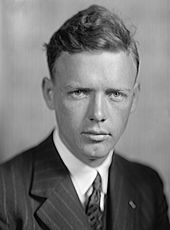 As airplanes became an accepted form of transportation, people began to consider traveling further and further. Of course, those first airplanes could never have made the flight across the ocean, but these days planes fly that far with ease. Still, someone had to be brave enough to take that first flight across the ocean. Someone had to trust their plane enough to make the attempt. British aviators John Alcock and Arthur Brown decided to be the first to make that leap when they made the first non-stop transatlantic flight in June 1919. Their plane was a modified First World War Vickers Vimy bomber. They flew from Saint John’s, Newfoundland to Clifden, Connemara, County Galway, Ireland. Like most accomplishments, the competition was fierce, and there had to be a reward for the winner. The Secretary of State for Air, Winston Churchill, presented them with the Daily Mail prize for the first crossing of the Atlantic Ocean by airplane in “less than 72 consecutive hours”. A small amount of mail was carried on the flight, making it the first transatlantic airmail flight. The two aviators were awarded the honour of Knight Commander of the Most Excellent Order of the British Empire a week later by King George V at Windsor Castle.
As airplanes became an accepted form of transportation, people began to consider traveling further and further. Of course, those first airplanes could never have made the flight across the ocean, but these days planes fly that far with ease. Still, someone had to be brave enough to take that first flight across the ocean. Someone had to trust their plane enough to make the attempt. British aviators John Alcock and Arthur Brown decided to be the first to make that leap when they made the first non-stop transatlantic flight in June 1919. Their plane was a modified First World War Vickers Vimy bomber. They flew from Saint John’s, Newfoundland to Clifden, Connemara, County Galway, Ireland. Like most accomplishments, the competition was fierce, and there had to be a reward for the winner. The Secretary of State for Air, Winston Churchill, presented them with the Daily Mail prize for the first crossing of the Atlantic Ocean by airplane in “less than 72 consecutive hours”. A small amount of mail was carried on the flight, making it the first transatlantic airmail flight. The two aviators were awarded the honour of Knight Commander of the Most Excellent Order of the British Empire a week later by King George V at Windsor Castle.
As with any record, there is always room for improvement. The first flight took place with two people on board, so on Ma 21, 1927, at age 25, Charles Lindbergh went from being an unknown United States Air Mail pilot, to world fame instantly, by making his Orteig Prize winning nonstop flight from Long Island, New York to Paris. He covered the 33½ hour, 3,600 miles alone in a single-engine Ryan monoplane called the Spirit of Saint Louis.  The plane was build for this flight. This was the first solo transatlantic flight, and the first non-stop flight between North America and mainland Europe. I wonder what he was thinking as he flew for 33½ hours alone over the ocean. He had to keep himself awake, and on course. There was no one else to do it. Most of us have a hard time staying awake for more than 17 or 18 hours, much less 33½ hours. It was an amazing feat, and one for which the fame he gained was well deserved.
The plane was build for this flight. This was the first solo transatlantic flight, and the first non-stop flight between North America and mainland Europe. I wonder what he was thinking as he flew for 33½ hours alone over the ocean. He had to keep himself awake, and on course. There was no one else to do it. Most of us have a hard time staying awake for more than 17 or 18 hours, much less 33½ hours. It was an amazing feat, and one for which the fame he gained was well deserved.
As with any record, someone had to beat it or improve on it or change it in some way. The record held until May 21, 1932, when Amelia Earhart became the first woman to make a solo air crossing of the Atlantic Ocean, from Newfoundland to Ireland. As with Charles Lindbergh, I wondered how Amelia stayed awake for all those hours, and what she was thinking as she flew along…alone for all those hours. I’m sure there was excitement in the extreme, but I’m sure she was weary after the flight was over too.
 When my nephew, Rob Masterson was a boy growing up in a house full of girls, he took it upon himself to pick on his mom, Cheryl Masterson, and his sisters, Chantel Balcerzak, Toni Chase, Elisabeth Masterson, and Jenny Spethman. For Rob, this was his chosen career. In fact, I would have to say that he has a Masters Degree in the field of Sister Teasing Torture…and he keeps up on his practice to this day, whether it is sisters, mom, daughters, Christina, Raelynn, and Anna, his nieces, and yes even his son, Matthew and his nephews. Even his aunts are not exempt. It’s all in good fun, of course, and the girls have to admit that they would wonder if he was mad at them, if he didn’t tease them, so we all just know that it is a fact of life.
When my nephew, Rob Masterson was a boy growing up in a house full of girls, he took it upon himself to pick on his mom, Cheryl Masterson, and his sisters, Chantel Balcerzak, Toni Chase, Elisabeth Masterson, and Jenny Spethman. For Rob, this was his chosen career. In fact, I would have to say that he has a Masters Degree in the field of Sister Teasing Torture…and he keeps up on his practice to this day, whether it is sisters, mom, daughters, Christina, Raelynn, and Anna, his nieces, and yes even his son, Matthew and his nephews. Even his aunts are not exempt. It’s all in good fun, of course, and the girls have to admit that they would wonder if he was mad at them, if he didn’t tease them, so we all just know that it is a fact of life.
While teasing has been a life-long career tor Rob, there is something else that he does,  that is probably more on the unusual side. Rob’s wife, Dustie tells me that Rob has the unusual habit of being a person who would rather give than receive. Now we have all heard the saying, “It’s better to give than receive,” but few people can be said to live by that motto. Rob really does. Dustie tells me of a situation that unfolded after she began running the Fresh Cut Department at Albertson’s on the west side of Casper. Most of us know that with use a knife gets dull, but Dustie was really unprepared for just how often her knife would become dull. Most of us don’t use our knives in quite the way Dustie does. Needless to say, her knife seemed to be forever dull. Rob had been given an old stone knife sharpener by his dad, and suddenly, there seemed to be a real need for it. For the first six months that Dustie ran the Fresh Cut Department, Rob would spend half an hour to and hour, every other day, painstakingly sharpening Dustie’s knife. Then around Christmas time he decided to take the Christmas money he had received from his mom, Cheryl Masterson, to buy a diamond sharpening stone…as Dustie said, “For me! It was his Christmas present and instead of picking a gift for himself he bought a nice stone to sharpen my knives with. He is just that way. One of the most selfless and giving people I know. He even sharpens the knives of my co-workers, because he knows they can help me more effectively if they have a good
that is probably more on the unusual side. Rob’s wife, Dustie tells me that Rob has the unusual habit of being a person who would rather give than receive. Now we have all heard the saying, “It’s better to give than receive,” but few people can be said to live by that motto. Rob really does. Dustie tells me of a situation that unfolded after she began running the Fresh Cut Department at Albertson’s on the west side of Casper. Most of us know that with use a knife gets dull, but Dustie was really unprepared for just how often her knife would become dull. Most of us don’t use our knives in quite the way Dustie does. Needless to say, her knife seemed to be forever dull. Rob had been given an old stone knife sharpener by his dad, and suddenly, there seemed to be a real need for it. For the first six months that Dustie ran the Fresh Cut Department, Rob would spend half an hour to and hour, every other day, painstakingly sharpening Dustie’s knife. Then around Christmas time he decided to take the Christmas money he had received from his mom, Cheryl Masterson, to buy a diamond sharpening stone…as Dustie said, “For me! It was his Christmas present and instead of picking a gift for himself he bought a nice stone to sharpen my knives with. He is just that way. One of the most selfless and giving people I know. He even sharpens the knives of my co-workers, because he knows they can help me more effectively if they have a good  sharp knife. I have never met someone who truly enjoys giving more than receiving. If you ask him to do something, and it’s within his power, he will go out of his way to do it.” Now, I could have tried to re-phrase that tribute to Rob from his loving wife, but I could never have said it as sweetly as she did.
sharp knife. I have never met someone who truly enjoys giving more than receiving. If you ask him to do something, and it’s within his power, he will go out of his way to do it.” Now, I could have tried to re-phrase that tribute to Rob from his loving wife, but I could never have said it as sweetly as she did.
Rob may tease his mom and sisters, but I know and have witnessed the fact that he will also bend over backward to help them with whatever the need help with, and I’m sure any one of them will tell you that his selfless acts of kindness, far outweigh any sister teasing torture them might have to endure. Today is Rob’s birthday. Happy birthday Rob!! Have a great day!! We love you!!
 My sister, Caryl Reed is younger than me by three years. She was always the ticklish one in the family…or at least the one who was the most fun to torture. That made her the “victim” of numerous attacks by all of the rest of her four sisters. We were probably brutal in some ways, because lets face it…not breathing is probably not good for a person. Nevertheless, we tickled for as long as we dared…stopping just short of the point of Caryl passing out. I think the Tickle Torture was a dreaded source of pleasure, for lack of a better term. Tickling doesn’t hurt, and some people even like light tickling, but the torture part was definitely a source of dread…for Caryl anyway. Caryl survived those torture years, got married, and moved away…go figure. It wasn’t her idea exactly, but I’m sure se didn’t miss the Tickle Torture while she was gone, and now that she lives closer, we don’t seem to attack her anymore. Still. she is always the potential “victim” in my mind.
My sister, Caryl Reed is younger than me by three years. She was always the ticklish one in the family…or at least the one who was the most fun to torture. That made her the “victim” of numerous attacks by all of the rest of her four sisters. We were probably brutal in some ways, because lets face it…not breathing is probably not good for a person. Nevertheless, we tickled for as long as we dared…stopping just short of the point of Caryl passing out. I think the Tickle Torture was a dreaded source of pleasure, for lack of a better term. Tickling doesn’t hurt, and some people even like light tickling, but the torture part was definitely a source of dread…for Caryl anyway. Caryl survived those torture years, got married, and moved away…go figure. It wasn’t her idea exactly, but I’m sure se didn’t miss the Tickle Torture while she was gone, and now that she lives closer, we don’t seem to attack her anymore. Still. she is always the potential “victim” in my mind.
Caryl has learned how to monitor breathing, as a respiratory therapist, so maybe we could tickle her even longer now…hmmm!! Still, she doesn’t live close enough for any kind of daily attacks. Caryl works at the Memorial Hospital of Carbon County in Rawlins, Wyoming, and is a respected, essential employee there. In fact, there are things they would have a hard time handling if she were not there. Caryl is dedicated to her job and her patients, and we are all very proud of her accomplishments.
Caryl and her husband, Mike Reed are working on their retirement home, that will ultimately bring them back  to Casper to stay. They have purchased a piece of land out on the Old Poison Spider Road…which takes me back to my own childhood years, when a friend of mine lived out there. They are building a beautiful home there with a huge garage, and beautiful living area. Caryl has always wanted to have horses, and they currently board horses there. It’s a win-win situation for her. Eventually they will live there permanently, and then hopefully they can have horses of their own. Either way, their place is a great place to live, and while it’s further outside of town than I want to be these days, they love it. Today is Caryl’s birthday. Happy birthday Caryl!! Watch out for tickle attacks, because I might mention this to Mike or Andrea. Have a great day!! We love you!!
to Casper to stay. They have purchased a piece of land out on the Old Poison Spider Road…which takes me back to my own childhood years, when a friend of mine lived out there. They are building a beautiful home there with a huge garage, and beautiful living area. Caryl has always wanted to have horses, and they currently board horses there. It’s a win-win situation for her. Eventually they will live there permanently, and then hopefully they can have horses of their own. Either way, their place is a great place to live, and while it’s further outside of town than I want to be these days, they love it. Today is Caryl’s birthday. Happy birthday Caryl!! Watch out for tickle attacks, because I might mention this to Mike or Andrea. Have a great day!! We love you!!

